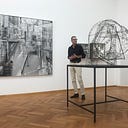Working Notes of a Practising Neo-Generalist (#24) — On ‘first loves’ and curiosity

On ‘first loves’ and curiosity
In First Love (available in Dutch only), the philosopher Stine Jensen writes about first time experiences and how they appeal to all our senses.
Whether literally our first love or the first time we come face to face with the Mona Lisa, these experiences are often defining moments in our lives. They kindle our curiosity, can give us a sense of purpose and may even lead us into entirely new directions.
But how often do we seek such experiences in our work? How often do we allow ourselves, and others, to leave the well-trodden path of efficiency, of what we know already, to seek new knowledge, try new things, shape new relationships?
These aren’t philosophical ‘niceties’; not anymore. In business environments that are increasingly dominated by complexity and ambiguity, leaders need to look beyond what they have learned and know. But rather than seeking to understand this complex and ambiguous world, they seek to create simpler worlds they can understand — comprehensible and manageable.
But instead of masking reality, we need to venture into the unknown. This requires an eagerness to learn. It demands curiosity; one of the essential tools for navigating an uncertain future.
It is time we start seeking new ‘first loves.’

“What I have is a malevolent curiosity. That’s what drives my need to write and what probably leads me to look at things a little askew. I do tend to take a different perspective from most people.” — David Bowie
